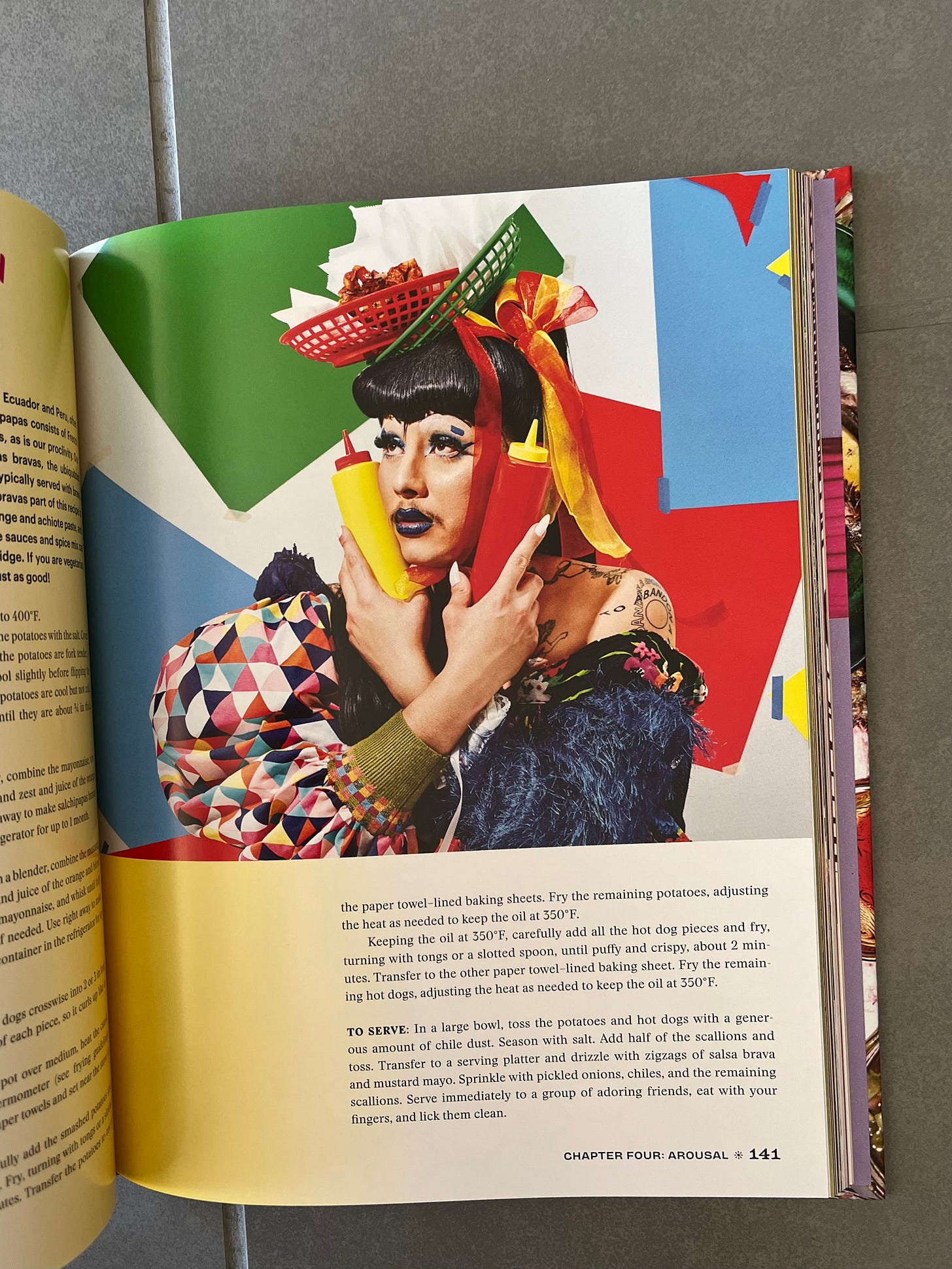The Joy of Queer Food
"Please Wait To Be Tasted" Fulfills the Shiny Promise of the LGBTQ Cookbook
Few cookbooks of the past sixty years have specifically flexed their lesbian, gay, or queer identities. A partial list: The Gay Cookbook (1965) by Lou Rand Hogan; Bloodroot Collective’s The Political Palate (1980); Dinner for Two (1981) by Rick Leeds and Gay Sunshine Press; The Whoever Said Dykes Can't Cook? Cookbook (1983), edited by Victoria Ramstetter and Maya Contenta; Out of Our Kitchen Closets: San Francisco Gay Jewish Cooking (1987) by Congregation Sha'Ar Zahav. In their time, most of these artifacts of queer food expressiveness churned far from the mainstream; several were fundraisers for local faith groups or community health orgs. All pushed the culture in ways not open to prior generations. Each places sex and sexuality—an explicitness about who we cruise, crush on, date, get sweaty, and build a life with—at the center of queer experience, and places those things at the heart of why, and how, and for whom, we cook
.
This is not to ignore, or in any way slight, the large and growing stock of cookbooks by out queer authors: Nik Sharma, Julia Turshen, Angela Dimayuga, Michael W. Twitty, Andy Baraghani, to name a few. These authors stress queerness is an essential part of their identity before the stove and at the table. Still, it seems to me that something else is at work in the LGBTQ books up top: a flowering of queer purpose through a dedication to cooking; an essential link to the nature of queerness itself.
That purpose, a faith in queer mission, marks every page of the just published Lil’ Deb’s Oasis cookbook, Please Wait To Be Tasted, like lubey fingers. Lil’ Deb’s is a restaurant in Hudson, New York, and the team of Carla Kaya Perez-Gallardo, Hannah Black, and Wheeler, are at the heart of it—or were (a note at the end of the book reports that Black and Wheeler moved on before it went to press).
Please Wait To Be Tasted is ferocious: a collection of high-saturation recipes the restaurant’s founders have tagged “tropical comfort food.” Mostly this is a juxtaposition of ingredients, techniques, and dishes from cuisines scattered close-ish around the equator: Lao, Salvadoran, Bahian, Peruvian, Mexican, Indian, and above all Ecuadorian (Perez-Gallardo grew up in an Ecuadorian family in Queens). Umeboshi Purple Potato Escabeche…Borscht con Bolas…Dulce de Leche Pork with Tamarind Dipping Sauce. The range of inspiration, plus possessing enough balls/ovaries/genderqueer magic to splice and merge so many different food traditions, makes you think a little of Mission Chinese Food (Black has cooked at MCF New York), if not the cringe-slash-liberating fusion cooking of the ‘eighties and early ‘nineties
.
Yet Perez-Gallardo, Black, and Wheeler don’t feel like tourists ransacking some airport global cuisine souvenir kiosk. They take responsibility for the exploitation implicit in “tropical comfort,” the first word’s colonial, geocentrist, and orientalist trip wires, strung above the racist and classist land mines of the second. This book pushes against its own assumptions, its grounding in privilege, its ripple impacts on the culture. It stresses over being good, when so much of food is abusive.
Still, Please Wait is a cookbook itching to be—from a white, heteropatriarchal POV—transgressive. Because, more than anything, it’s a book all shiny with sex: about the exceptionalism that binds queer people together in the act of owning our sensuality. There’s an implicit, but certainly not subtle, argument here: that queer and trans people are uniquely equipped to remake the table as a place of community; to use food and eating—even tasting deeply—as a way to redefine kinship freed from the flex cuffs of blood relation.
“At the dinner table we create our own culture with its own set of manners,” Perez-Gallardo/Black/Wheeler write. “Reaching over, arms crossing, double dipping, talking while eating, all are acceptable. And nothing feels better than eating with our hands, surrounded by the people we love. We live for this loss of inhibition. Get swept up in the moment, and the outside world fades away.
It’s remarkably similar in tone and feeling to Zoe Adjonyoh’s essay “Queer Intelligence: We Mobilize Through Food” in Black Food. “Food,” they write, “has become a vehicle through which the queer community has found commonality, sought visibility, championed diversity, and encouraged activism.”
This visibility—this showing out of commonality around the crowded table—is something the authors of those LGBT cookbooks of forty and fifty years ago could likely never imagine, or—in its steeping in diversity—even grasp, yet it’s firmly in the same tradition, delivering on the promise of those books. Children of alternative queer liberation and reclaimed Pride: Please Wait To Be Tasted is your Nigella. #






